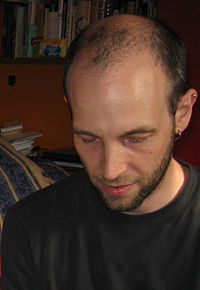Kevin Buzzard
 From Wikipedia the free encyclopedia
From Wikipedia the free encyclopedia
Kevin Buzzard | |
|---|---|
 Buzzard in 2007 | |
| Born | 21 September 1968 |
| Alma mater | Trinity College, Cambridge |
| Awards | Whitehead Prize (2002) Senior Berwick Prize (2008) |
| Scientific career | |
| Fields | Mathematics |
| Institutions | Imperial College London Harvard University |
| Thesis | The Levels of Modular Representations (1995) |
| Doctoral advisor | Richard Taylor |
| Doctoral students | Daniel Snaith Toby Gee |
Kevin Mark Buzzard (born 21 September 1968) is a British mathematician and currently a professor of pure mathematics at Imperial College London. He specialises in arithmetic geometry and the Langlands program.[1]
Biography
[edit]While attending the Royal Grammar School, High Wycombe he competed in the International Mathematical Olympiad, where he won a bronze medal in 1986 and a gold medal with a perfect score in 1987.[2]
He obtained a B.A. degree in Mathematics at Trinity College, Cambridge, where he was Senior Wrangler in 1990, and a C.A.S.M. in 1991.[3] He then received his Ph.D. under the supervision of Richard Taylor with a thesis titled The levels of modular representations in 1995.[3][4]
He took a lectureship at Imperial College London in 1998, a readership in 2002, and was appointed to a professorship in 2004. From October to December 2002 he held a visiting professorship at Harvard University, having previously worked at the Institute for Advanced Study, Princeton (1995), the University of California Berkeley (1996-7), and the Institute Henri Poincaré in Paris (2000).[3]
He was awarded a Whitehead Prize by the London Mathematical Society in 2002 for "his distinguished work in number theory",[5] and the Senior Berwick Prize in 2008.[6]
In 2017, he launched an ongoing formalization project and blog involving the Lean theorem prover[7] and has since promoted the use of computer proof assistants in future mathematics research. He gave a plenary lecture at the International Congress of Mathematicians in 2022 on the topic.[8]
He was the PhD supervisor to musician Dan Snaith,[9] also known as Caribou, who received a PhD in mathematics from Imperial College London for his work on Overconvergent Siegel Modular Symbols.[10]
In 2024, Buzzard and collaborators were handed a five-year ESPRC grant to begin formalising Fermat's Last Theorem in Lean.[11]
References
[edit]- ^ Buzzard, Kevin (8 May 2019). "What is the Xena project?". Xena Project. Retrieved 1 July 2022.
- ^ "Kevin Mark Buzzard". Participants. International Mathematical Olympiad. Retrieved 1 April 2024.
- ^ a b c "Curriculum Vitae" (PDF). Kevin Buzzard. 8 November 2012. Retrieved 14 February 2024.
- ^ Kevin Buzzard at the Mathematics Genealogy Project
- ^ "Citation for Kevin Mark Buzzard". Archived from the original on 3 October 2009. Retrieved 2 February 2007.
- ^ "LMS Prizewinners". Archived from the original on 4 August 2007.
- ^ Buzzard, Kevin (5 September 2019). "The future of mathematics?" (PDF). Archived from the original (PDF) on 24 August 2021. Retrieved 1 July 2022.
- ^ Kevin Buzzard (9 July 2022). "The rise of formalism in mathematics". YouTube.
- ^ "Kevin Buzzard's research notes". Retrieved 16 July 2022.
- ^ Daniel Snaith. "Overconvergent Siegel Modular Symbols" (PDF). 2.imperial.acuk. Retrieved 16 July 2022.
- ^ "EP/Y022904/1: 'Formalising Fermat'". ESPRC. Retrieved 25 August 2024.